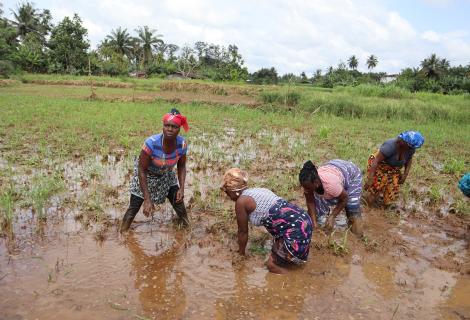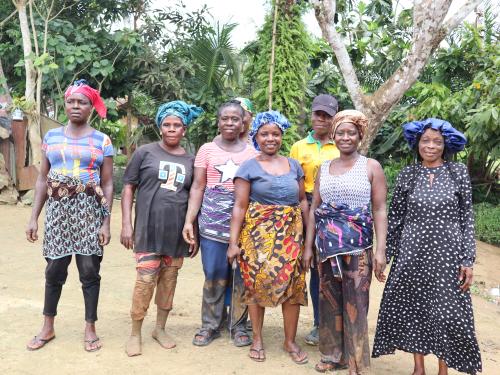Empowering & Protecting the Hands That Feed Liberia, Women Farmers With SADFONS in Maryland Concern over Lack of Safety Gears to Farm

No Safety Gears for Swamp Work, Women Farmers Corporative Community Women Self-Empowerment and Advocacy (CCWSEA) Told GASFP Impact Review Team in Maryland
Liberia Women Farmers Produce nearly 60% of the nation’s food, yet they remain the most underserved in the country’s agriculture sector.
Despite their vital role, many women farmers in Liberia still lack access to land, modern tools, training and even basic safety gears to farm as simple as rain boots, gloves, among others.
This is the reality for the Women Farmers Cooperative Community Women Self-Empowerment and Advocacy (CCWSEA) in Pleebo, Maryland County.
Through the SADFON project under the rice value chain, these women are striving to increase productivity, but they say they need adequate support that truly reaches them.
The women famer raised these concerns during the GAFSP impact review of the SADFONS Project carried out the Marland Cassava and Vegetable Farmers Cooperative (MACAVEFC) alongside the CCWSEA women rice farmers.
Speaking during a one-day group discussion with ActionAid Liberia’s team which is conducting the impact review of the Smallholder Agriculture Development and Food Nutrition Security (SADFONS), the chairperson of the women farmers, Madam Marie Woart, said she and her network members fear the risk of contracting water-born diseases as a result of working for several hours in the swamp without safety gears.
Though the group lauded the SADFONS Project for providing them the rice seedings, they however said that the condition under which they are carrying out their farming practices put them at huge health risk. They are therefore calling on authorities in charge of the SADFONS Project at the Ministry of Agriculture to remedy their situation.
“We want to continue planting more rice and we even want to make the farm big, but the work we do in this swamp, we can go inside it to work without rainboot, no gloves." Marie said.
Even their own approach in their little efforts to protect themselves is still not good enough she added, "We have to double about 5 to 6 socks, and all kinds of things are in this swamp.” Marie explained."

“We need tools for this swamp work. It’s full of sickness. Sometimes when we work in the swamp, our skin starts to itch and spots appear on our bodies,” she said.
In spite of these challenges, Marie, Helena and members of the group say with the right support given to the group, they plan to expand the rice farm the next farming season, and to continue growing more rice.
"Besides the rice sign that SADFONS gave us, nothing we received from them. Helena said," she added "in fact the rice they give us was not even seed rice, but nursery rice that they themselves put the nursery and they brought it and give them to us to transplant, we don't have any tools."
During the impact visit, Maryland County Coordinator, Mr. Peter Klah, outlined prolong procurement process and delay to deliver on farming products to the farmers by their central team as factors causing demotivation among farmers while at the same time leaving farmers without the relevant farming essentials during planting seasons.
"One of the major challenges confronting the farmers isthat supply can arrive very late for the farmers and by the time the supply comes, the farming time is almost over. Klah told the team.
Commenting on other key challenges the group faced, he informed the assessment team that the irrigation system also constructed by the contracted engineering company was also poorly done.
Klah inform AAL Team that when there's heavy rainfall, the farmers field get overtaken by flood water, completely covering all the rice plots leaving most of the farmers' field almost completely destroyed.